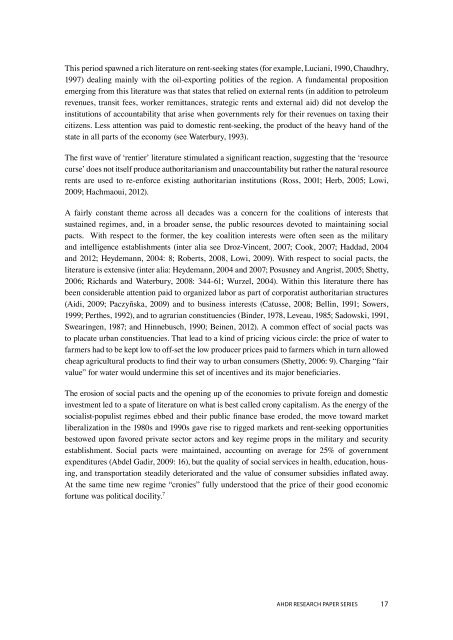The Political Economy of Climate Change in Arab Countries
The Political Economy of Climate Change in Arab Countries
The Political Economy of Climate Change in Arab Countries
You also want an ePaper? Increase the reach of your titles
YUMPU automatically turns print PDFs into web optimized ePapers that Google loves.
This period spawned a rich literature on rent-seek<strong>in</strong>g states (for example, Luciani, 1990, Chaudhry,1997) deal<strong>in</strong>g ma<strong>in</strong>ly with the oil-export<strong>in</strong>g polities <strong>of</strong> the region. A fundamental propositionemerg<strong>in</strong>g from this literature was that states that relied on external rents (<strong>in</strong> addition to petroleumrevenues, transit fees, worker remittances, strategic rents and external aid) did not develop the<strong>in</strong>stitutions <strong>of</strong> accountability that arise when governments rely for their revenues on tax<strong>in</strong>g theircitizens. Less attention was paid to domestic rent-seek<strong>in</strong>g, the product <strong>of</strong> the heavy hand <strong>of</strong> thestate <strong>in</strong> all parts <strong>of</strong> the economy (see Waterbury, 1993).<strong>The</strong> first wave <strong>of</strong> ‘rentier’ literature stimulated a significant reaction, suggest<strong>in</strong>g that the ‘resourcecurse’ does not itself produce authoritarianism and unaccountability but rather the natural resourcerents are used to re-enforce exist<strong>in</strong>g authoritarian <strong>in</strong>stitutions (Ross, 2001; Herb, 2005; Lowi,2009; Hachmaoui, 2012).A fairly constant theme across all decades was a concern for the coalitions <strong>of</strong> <strong>in</strong>terests thatsusta<strong>in</strong>ed regimes, and, <strong>in</strong> a broader sense, the public resources devoted to ma<strong>in</strong>ta<strong>in</strong><strong>in</strong>g socialpacts. With respect to the former, the key coalition <strong>in</strong>terests were <strong>of</strong>ten seen as the militaryand <strong>in</strong>telligence establishments (<strong>in</strong>ter alia see Droz-V<strong>in</strong>cent, 2007; Cook, 2007; Haddad, 2004and 2012; Heydemann, 2004: 8; Roberts, 2008, Lowi, 2009). With respect to social pacts, theliterature is extensive (<strong>in</strong>ter alia: Heydemann, 2004 and 2007; Posusney and Angrist, 2005; Shetty,2006; Richards and Waterbury, 2008: 344-61; Wurzel, 2004). With<strong>in</strong> this literature there hasbeen considerable attention paid to organized labor as part <strong>of</strong> corporatist authoritarian structures(Aidi, 2009; Paczyñska, 2009) and to bus<strong>in</strong>ess <strong>in</strong>terests (Catusse, 2008; Bell<strong>in</strong>, 1991; Sowers,1999; Perthes, 1992), and to agrarian constituencies (B<strong>in</strong>der, 1978, Leveau, 1985; Sadowski, 1991,Swear<strong>in</strong>gen, 1987; and H<strong>in</strong>nebusch, 1990; Be<strong>in</strong>en, 2012). A common effect <strong>of</strong> social pacts wasto placate urban constituencies. That lead to a k<strong>in</strong>d <strong>of</strong> pric<strong>in</strong>g vicious circle: the price <strong>of</strong> water t<strong>of</strong>armers had to be kept low to <strong>of</strong>f-set the low producer prices paid to farmers which <strong>in</strong> turn allowedcheap agricultural products to f<strong>in</strong>d their way to urban consumers (Shetty, 2006: 9). Charg<strong>in</strong>g “fairvalue” for water would underm<strong>in</strong>e this set <strong>of</strong> <strong>in</strong>centives and its major beneficiaries.<strong>The</strong> erosion <strong>of</strong> social pacts and the open<strong>in</strong>g up <strong>of</strong> the economies to private foreign and domestic<strong>in</strong>vestment led to a spate <strong>of</strong> literature on what is best called crony capitalism. As the energy <strong>of</strong> thesocialist-populist regimes ebbed and their public f<strong>in</strong>ance base eroded, the move toward marketliberalization <strong>in</strong> the 1980s and 1990s gave rise to rigged markets and rent-seek<strong>in</strong>g opportunitiesbestowed upon favored private sector actors and key regime props <strong>in</strong> the military and securityestablishment. Social pacts were ma<strong>in</strong>ta<strong>in</strong>ed, account<strong>in</strong>g on average for 25% <strong>of</strong> governmentexpenditures (Abdel Gadir, 2009: 16), but the quality <strong>of</strong> social services <strong>in</strong> health, education, hous<strong>in</strong>g,and transportation steadily deteriorated and the value <strong>of</strong> consumer subsidies <strong>in</strong>flated away.At the same time new regime “cronies” fully understood that the price <strong>of</strong> their good economicfortune was political docility. 7AHDR RESEARCH Paper series17
















